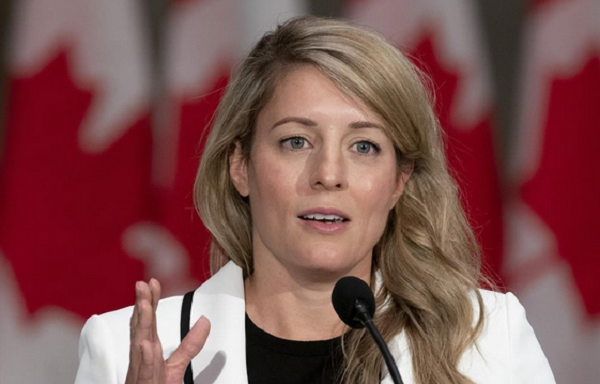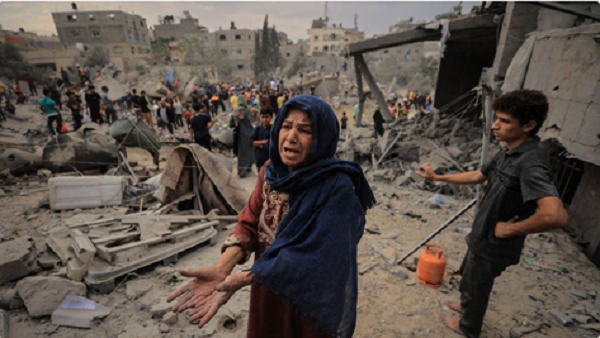Canada took same step as Western governments, sanctioning the Sudan war
Foreign Affairs Minister Mélanie Joly has announced Canada’s first sanctions in connection with Sudan’s devastating war, taking action against six Sudanese individuals and companies that she blames for undermining peace in the country.
Other Western governments took similar steps many months ago, with the United States and Britain announcing Sudan-related sanctions as early as mid-2023. It is unclear why Canada waited so long to announce its own sanctions, but analysts have been increasingly noting the widening gap between Canada and other Western countries on the Sudan issue.
Canada’s announcement came on the first anniversary of the outbreak of the disastrous war, which has forced nearly nine million people to flee their homes and has triggered the world’s biggest displacement crisis and a looming famine.
The Canadian sanctions are being imposed on individuals and companies that have links to the two warring parties: the Sudanese Armed Forces and the paramilitary Rapid Support Forces (RSF).
One of the sanctioned individuals is Abdelrahim Hamdan Dagalo, a senior RSF leader and the brother of RSF commander Mohamed Hamdan Dagalo.
“Canada is imposing sanctions on six individuals and entities for directly or indirectly undermining peace, security and stability in Sudan,” Global Affairs Canada said in its announcement on Monday.
“The scale of violence and human suffering is devastating,” it said in the statement. “Millions continue to face acute shortages of food, water, electricity and access to medical care. There are widespread reports of sexual and gender-based violence, especially against women and girls in Darfur. We remain deeply concerned of these reports, and of reports of ethnic cleansing by the RSF in Darfur.”
The Canadian sanctions are “consistent with similar actions taken by international partners, including the European Union, the United Kingdom, and the United States,” it said.
Nicholas Coghlan, a former Canadian ambassador to Sudan, said the sanctions are “overdue but most welcome.”
For months, Mr. Coghlan has been publicly noting that Canada had failed to impose any of the sanctions that other countries have announced on Sudan.
On Monday, he said he hopes that the Canadian sanctions – along with Friday’s announcement of $132-million in new Canadian aid to Sudan and its neighboring countries – will be “a signal of Canadian re-engagement in Sudan, following a year of absence from the scene.”
The warring parties in Sudan are largely financed by the sale of gold on international markets, and Canada could take a key role in disrupting these sales, Mr. Coghlan told The Globe and Mail on Monday.
“Canada is home to more than 50 per cent of companies worldwide that prospect for and mine gold,” he said. “As such we are uniquely placed to work with allies in tracking and intercepting sales.”
Canada’s international development minister, Ahmed Hussen, said on Monday that the warring parties must stop blocking the flow of humanitarian aid to the estimated 25 million people – half of Sudan’s population – who need emergency assistance.
“We cannot let this become a forgotten crisis,” Mr. Hussen told a Sudan fund-raising conference in Paris.
“By all measures the sheer scale of humanitarian needs in Sudan – the number of people displaced and facing hunger – is one of the worst humanitarian crises of our time. The scale of the violence, particularly sexual violence, and human suffering is atrocious, and we must continue to help the people of Sudan.”
More than US$1.5-billion in funding pledges for Sudan and its neighbours were announced by governments and organizations on Monday at the Paris conference, according to an unofficial tally.
The war in Sudan has been overshadowed by the global focus on the Gaza and Ukraine conflicts, but in many ways it is a bigger crisis than any other in the world, with a larger number of displaced people and with millions of Sudanese facing the threat of famine within weeks.
The death toll is unknown, but a United Nations report estimated there were 10,000 to 15,000 dead in single city in the Darfur region of western Sudan after a wave of ethnically targeted killing by the RSF and its allied militias. Many other cities, including the capital, Khartoum, have suffered massive violence and heavy casualties in the war.
More than 70 per cent of Sudan’s hospitals and clinics have been destroyed or forced to shut down, and about 19 million children have been out of school for a year, sparking fears of a generational catastrophe.
This article was first reported by The Globe and Mail












